Miracles in the Midst of Chaos: An Unexpected Hero Saves a Life
Betzalel Bazak was critically injured in war, yet a devoted medic stayed behind, saving his life. His wife, Efrat, shares their miraculous journey and an unexpected visit from Benny Gantz.
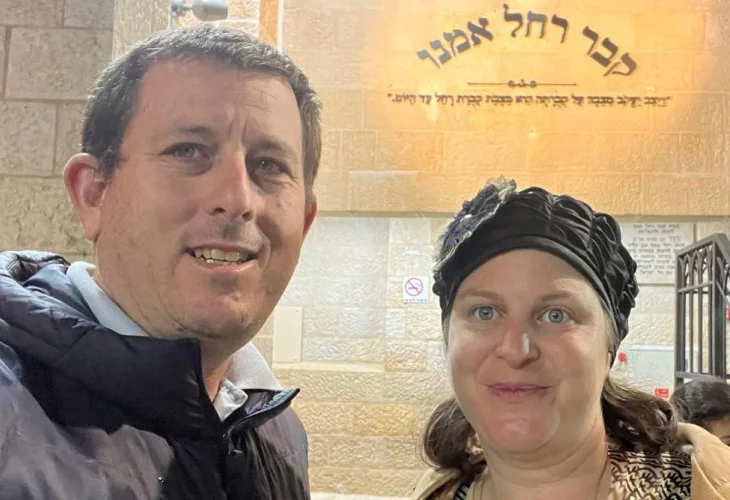 Betzalel and Efrat Bazak
Betzalel and Efrat BazakSince their wedding over twenty years ago, Betzalel and Efrat Bazak lived in their home in the City of David, beneath the Temple Mount. About a year and a quarter ago, they had to move to a different Jerusalem neighborhood due to Betzalel's injury.
Bazak, a physicist and scientist, serves as a reservist officer in a paratrooper brigade. On Simchat Torah, when the first sirens sounded, he immediately realized that a war had broken out, quickly packed a bag and hurried south to meet his unit. Efrat remained at home with their seven children. Betzalel fought in Kfar Aza for several days and after training and readiness, entered the Gaza Strip.
"I Would Never Forgive Myself"
On the 2nd of Shvat 5784, after fourteen weeks of fighting, Betzalel's team entered a house in Khan Yunis. The soldiers settled in, and Betzalel, as his role required, searched the house for enemy intelligence. As he passed by a window, an explosive device went off outside, and shrapnel hit a major artery. He began to lose a massive amount of blood. The medic with the team recognized the critical situation and immediately began to treat him.
Recently, the Bazak family received footage from a head camera of one of the soldiers, documenting the treatment moments. The video shows the composure with which the medic operated. "Our miracle was that this medic was specifically knowledgeable about this type of injury," Efrat says. "During a test he took, he was specifically examined on this complex injury, which can't be treated with a tourniquet. We saw the expertise and control in his actions. He really saved Betzalel's life."
"The sequence of miracles started the night before," she continues. "The medic was supposed to go home for Shabbat after fourteen weeks of reserves. That night, he called his wife, asked for her forgiveness, and wondered if she would agree that he stay this Shabbat. He explained that a military operation was planned, and he didn’t want his teammates to rely on further-off medical teams in case of an injury. His wife asked him: 'How would you feel if there was an incident and you weren't there?' The medic responded, 'I would never forgive myself.' Her response was, 'In that case – stay.' Thanks to her, my husband received immediate and professional care, and his life was saved."
On Independence Day a year ago, a few months after the injury, a thanksgiving meal was held, and the guests of honor were the medic and his wife.
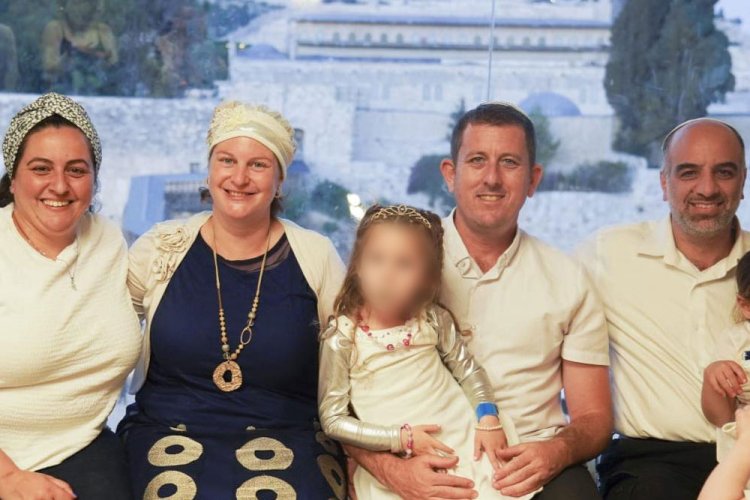 (At the Thanksgiving Meal on Independence Day. On the sides of the picture: Shlomi the medic and Sarah)
(At the Thanksgiving Meal on Independence Day. On the sides of the picture: Shlomi the medic and Sarah)"To Ein Kerem, Please"
Betzalel was loaded onto a helicopter. Despite his critical injury, he was still semi-conscious and even managed to joke weakly with the pilot, "To Hadassah Ein Kerem, please." Jerusalem was very rainy that day, so his request was denied, and he was transferred to Ichilov Hospital in Tel Aviv.
"It’s possible that if the team on the helicopter had understood the severity of his injury, they would have dropped him off at a closer hospital. The battalion physician said his condition was critical and unstable, but likely due to a misunderstanding, he was taken to Ichilov. This too was a miracle," Efrat mentions, "because at Ichilov were experts in the type of injury Betzalel had, who fought for his life."
A team of doctors awaited Betzalel as he got off the helicopter. "One doctor looked at him, realized the situation was dire, and that every second was critical. That doctor, not a young man, climbed over Betzalel and stopped the bleeding with his hands, while the medical team rushed his bed, with Betzalel and the doctor, to the operating room."
Efrat recounts how the senior doctor, recognizing the severe injury and valuable seconds, quickly opened Betzalel's chest and closed the main artery with his fingers to keep his heart from losing the last drops of blood remaining in his body. He didn't hesitate to even put on gloves. "It sounds insane, but the doctors essentially took in a dead man. Meanwhile, on the ground, the battalion doctor ordered a procedure to collect items from the scene for burial, as he wasn’t sure Betzalel would survive."
Where did you receive the news about his injury?
"Betzalel's injury occurred on Friday afternoon, and we were, of course, in the midst of Shabbat preparations. When severe injuries occur, the army sends a military vehicle to the injured soldier's wife to take her to the hospital. Because we live in a complex area for access, they called me to explain how to arrive." Efrat left a bustling home, with the kids in the shower, and hurried to Ichilov.
In Charge of Optimism
In what condition did you find your husband at the hospital?
"When I arrived, Betzalel was in surgery. The operation went on and continued into Shabbat, while his parents and I waited outside. Later, Betzalel was hospitalized in intensive care, ventilated and sedated. As part of the many miracles we experienced, at first, we didn’t truly comprehend how severe the situation was. Regardless, even later, I made sure to remain calm and optimistic.
"I felt that medically, my husband was in good hands. I told myself that if so, then I was in charge of something else: optimism, smiles, and hope. I tried my best to encourage and accurately translate the situation - to myself, the children, his parents, and all the other circles." Looking back, Betzalel’s parents said they don’t know how they would have endured the trauma and helplessness of that Shabbat without Efrat's optimism.
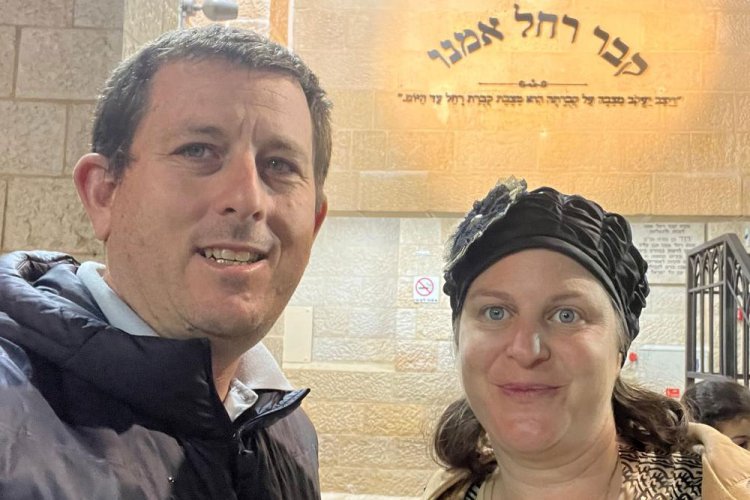 (Celebrating his recovery at Rachel's Tomb)
(Celebrating his recovery at Rachel's Tomb)How was this optimism expressed?
"First of all, I focused on choosing positive words that expressed life and strength. For instance, when the casualty officer contacted me, I saved her in my phone as the 'Recovery Officer.' We asked the public to pray for Betzalel 'among all the recoverers of Israel.' It was very important to me to insist on language that opened a door to healing and life."
One morning, the mother of another wounded soldier who was also hospitalized saw Efrat and asked her how she could smile like that, here, in intensive care, in the morning. Efrat replied that on the contrary, her smile needed to be even wider to infect her husband with it.
Efrat updated many concerned individuals in messages she sent out every few days, titled "Journey to Recovery and Redemption." In these updates, she detailed the miracles and progress, clinging to every positive "crumb" and highlighting it.
"From the moment I was informed about the injury – during the ride to the hospital and the long wait outside the operating room – I strongly felt he would live. I felt Hashem gave me a gift: to feel with certainty that there was an enormous challenge here, but we would get through it, and there would be a happy ending," she recalls.
"A Stroke of Providence"
On one of the days, then-Minister Benny Gantz visited the department where Betzalel was hospitalized. "Betzalel doesn't like media and politics and generally avoids cameras, so he made sure to 'disappear' from the department during the visit to a side room," Efrat says with a smile. "When we returned to the room after the visit, I realized that some of the messages delivered in the department were weakening. I couldn’t allow this to be the impression the minister left with."
The minister’s entourage was still present at the hospital, and Efrat hurried to them. She approached Gantz, introduced herself, and told him about her husband's self-sacrifice, who enlisted despite being exempt due to his age, and how they saw it as a privilege to be partners. The minister listened intently and asked where her husband was. Efrat explained that Betzalel did not want to be exposed to cameras. Upon hearing this, Gantz instructed his entourage not to join him, and he went alone to Betzalel's room. They talked, and Betzalel told the minister about the injury event, casually using the word 'coincidence.'
"Gantz approached the flag that hung in the room, where visitors used to sign, wrote 'coincidence,' then drew a double arrow and added 'Hashem orchestrated it,'" Efrat recounts the surprising reaction. "This echoed again what we already felt, how much Hashem orchestrated everything. From the medic to the battalion doctor and the quick evacuation, the doctor who jumped on my husband’s bed, and more. Countless miracles."
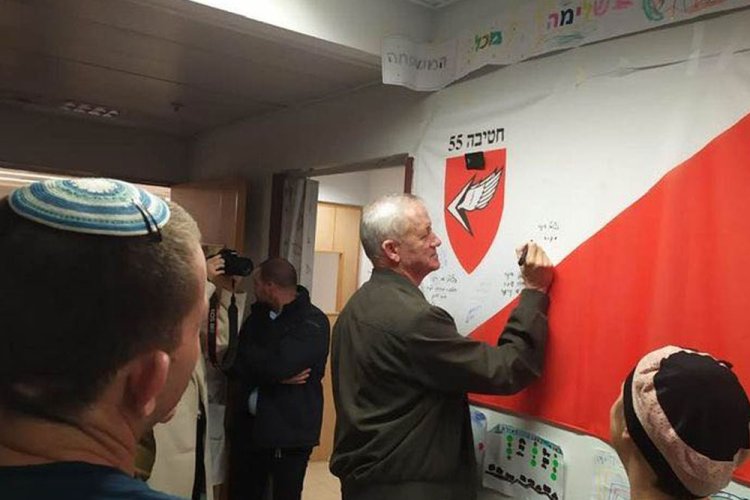 (Benny Gantz signing the flag in Betzalel's room)
(Benny Gantz signing the flag in Betzalel's room)What challenges exist in this journey of rehabilitation?
"There are challenges, it's definitely not all 'sweet honey.' There is still rehabilitation, pain, scars and a need to strengthen the body, spirit, and soul," shares Efrat candidly. "While I maintained positivity, the complexity was still substantial. Sometimes, people around misinterpreted that positivity and I received weakening responses. Overall, it’s important to know to be sensitive in this complex situation."
"Our Place in This Circle"
What are the pillars of strength for you, Betzalel, and the children?
"I believe we didn’t reach this circle of wounded families by chance. We try to strengthen ourselves and others within this reality. The main pillar for me is our children. Despite ostensibly worrying about them, they gave me immense joy and strength to hold on. Even before the injury, when Betzalel was enlisted and rarely home, it was full of fun thanks to them. Even on Shabbat and holidays, we were filled with the 'togetherness.' And of course, thanks to the support of parents and the extended family,"
"Aside from them, one of the significant pillars for me is a group of the wives of the injured called 'Sisters of Steel.' It’s amazing how much strength it gives us to go through this challenging journey together. We also owe a lot of gratitude to the various associations that care for the injured and their families, such as Brothers for Life, OneFamily, Brothers to the Rear, Beit HaLochem, Natal, the Anchor, Advat, the municipal coordinators, and many more initiatives of good people."
Efrat is an author by profession. During the long recovery period, she collected a compilation of poems from IDF wounded and their wives. This collection, titled "Between War and Healing," offers a glimpse into the complex world of challenges. It is important to her to continue to keep the wounded in mind. "Even when it seems outwardly they are fine, and even if they return to reserves or work, signaling some outward strength – the process is long. It’s important to realize that not only the injured person goes through this challenge, but his whole family, and it’s crucial to be sensitive and alleviate their burden where possible."
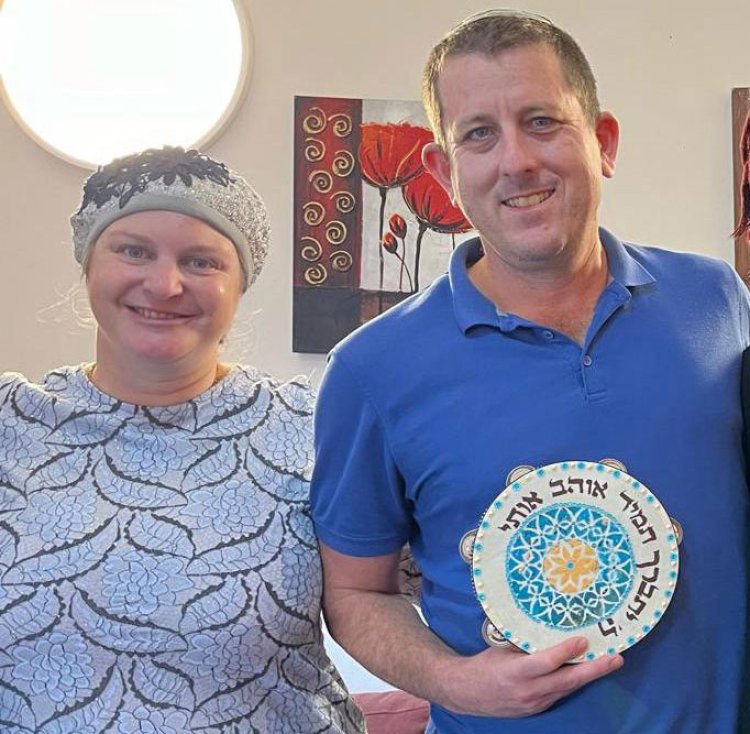 (A drum that Efrat and the children made for Betzalel)
(A drum that Efrat and the children made for Betzalel)As a final message, Efrat wishes to express admiration for the bravery and strength she observes in the wounded, their wives, and families. "When I see the courage of these heroes, both at the front and in rehabilitation, the dedication of body and soul, the faith and the desire to cling to good, the feminine resilience, and the supreme effort to strengthen, recover, and return to contribute to the people and the land – I believe together we will prevail."

